At Home With Humba, the Mountain Gorilla
Air Date: Week of July 4, 2014
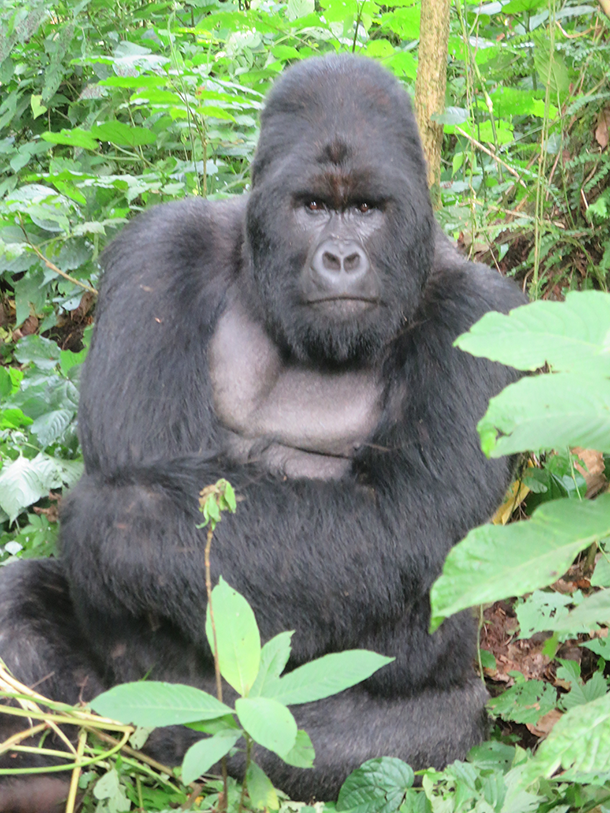
The silverback, Humba, is relaxed yet imposing around people. (Photo: Evelyn Iritani)
Led by park rangers, journalist Karen Lowe heads into Virunga National Park in the Congo in search of Humba, leader of a troop of endangered mountain gorillas. Charcoal traders, oil drilling and rebels exploit the region, and threaten the gorillas, their habitat and the rangers’ lives. But as Karen explains to host Steve Curwood, there is good news, as the oil company conducting testing has promised to suspend activities in the park, and money is flowing in to support ecotourism.
Transcript
CURWOOD: It’s Living on Earth. I’m Steve Curwood. Almost a century ago, in a vast expanse of Central Africa known as the Belgian Congo, King Albert I of Belgium decreed the continent's first national park to protect key-habitat for our biggest and most impressive relative, the mountain gorilla. The park still survives. Today it's known as Virunga National Park, in what is now the Democratic Republic of the Congo, or DRC, but a series of wars and rebellions since independence in 1960 have killed more than five-million people, and protecting almost everything there has been a challenge. There are still gorillas, but they are in deep trouble. Reporter Karen Lowe recently traveled to Virunga where one of the park rangers, Innocent Mbrumbrwe, led her deep into the forest in search of gorillas.
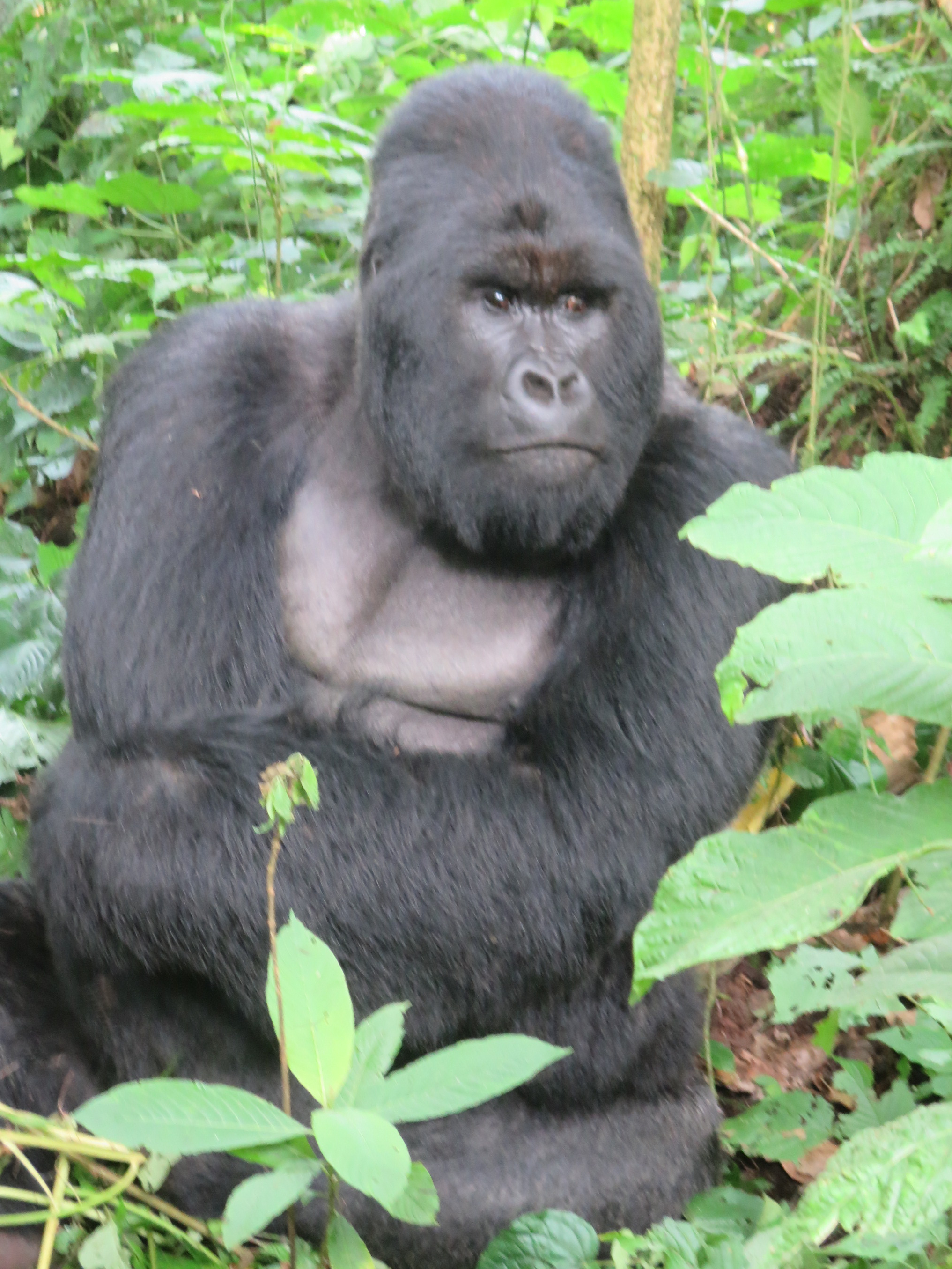
Makawamwe, a blackback in the Humba family living in the Mikeno sector of the Virunga National Park, watches over the family as visitors approach. (Photo: Evelyn Iritani)
MBRUMBRWE: I can say it’s because I love them. Every time when I'm with these animals I feel very good to be with these gorillas because they are like humans.
CURWOOD: Here's Karen's report.
[BIRDS CHIRPING]
LOWE: When trekking through Virunga National park, your senses are always on overdrive. You don’t want to miss anything. Virunga has rainforests and volcanoes. Its savannah wildlife rivals the Serengeti. The source of the Nile is here. It has the largest lava lake on Earth, and glaciers. There are at least one-thousand species of animals, including some odd ones, like the Okapi. It looks like a cross between a zebra and a giraffe. Or the recently-discovered Lesula monkey with a human-looking, professorial face.
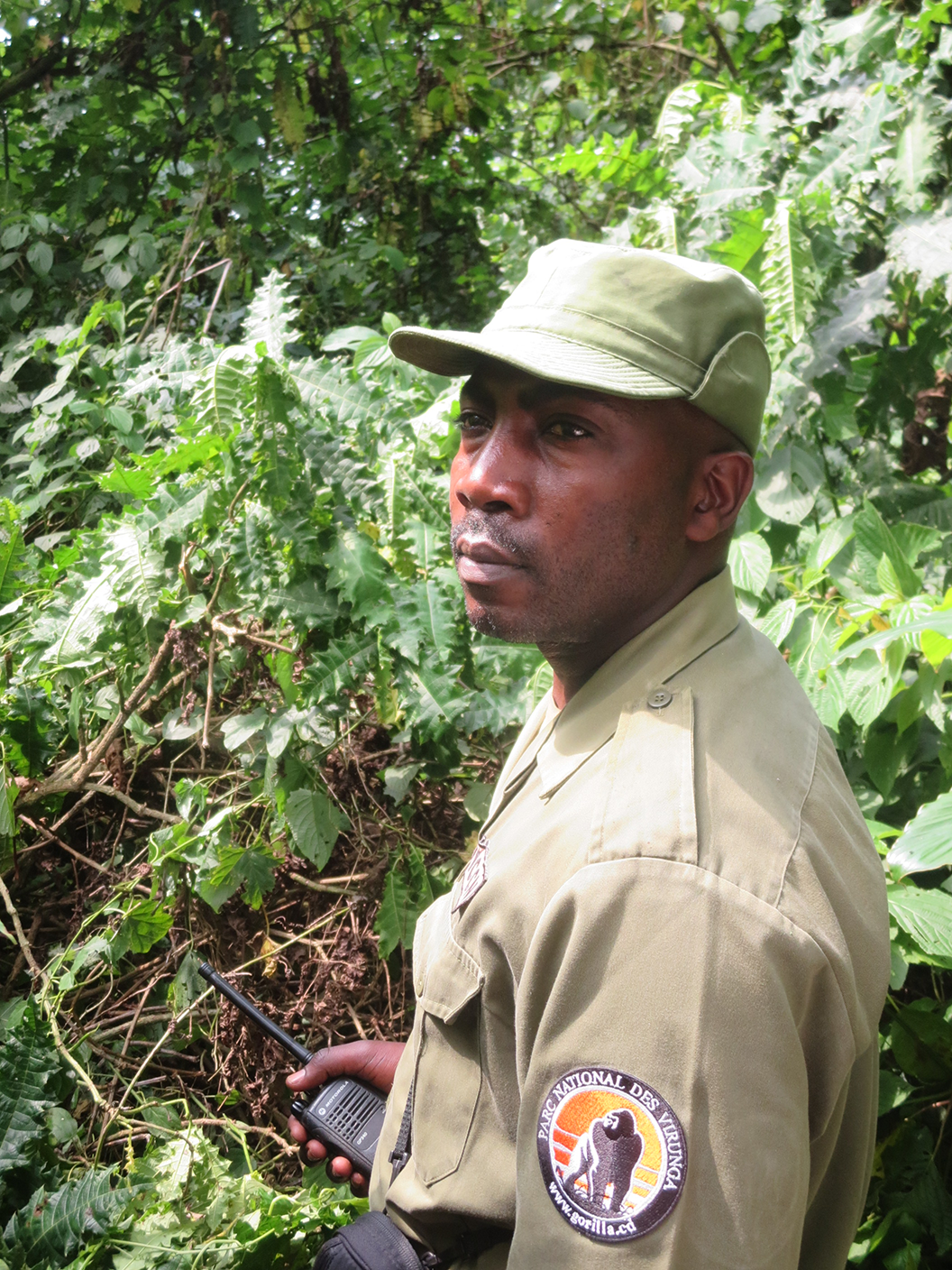
Ranger Innocent Mbruwamwe looks for signs that the Humba troop in the forest. (Photo: Evelyn Iritani)
But the marquee draw—the reason most people come—is the mountain gorilla, the world’s largest primate. The species is on the critically endangered list. There are only eight-hundred and eighty in the world and a quarter of them live here.
MBRUMBRWE: Are you ready? Put the mask on.
[BIRDS CHIRPING]
LOWE: Right now, I’m following Innocent Mbrumbrwe.
[WALKING IN THE BRUSH AND HACKING AT THE FOLIAGE]
We’re looking for one gorilla in particular: Humba, a silverback with about 20 family members. Innocent’s a 38 year-old ranger and an expert on mountain gorillas. He runs the park’s southern sector. We’re flanked by two other rangers with machetes and AK-47s, just in case we encounter hostile rebels and charcoal traders.
MBRUMBRWE: Every time you have to be together.
LOWE: Nearly one-hundred and fifty rangers have been killed since this country descended into war almost twenty years ago. Just before I arrived, one ranger was killed and two were injured.
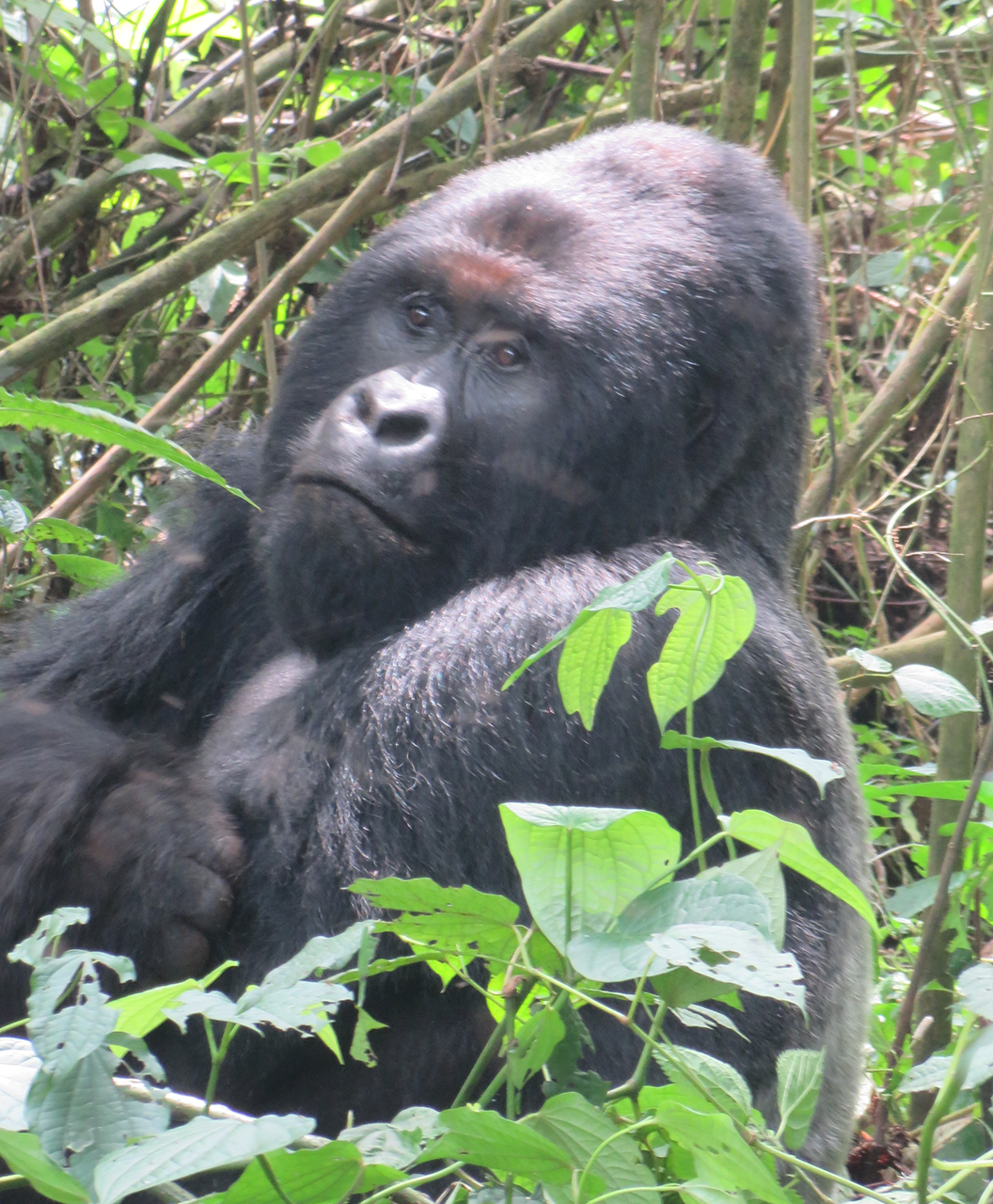
After Innocent spent years acclimating the gorillas to human presence, Humba, the silverback, is quite at ease with visitors. (Photo: Evelyn Iritani)
The gorillas are deep in the forest, and to get to them, you have to hack your way in.
[SOUNDS OF HACKING WITH MACHETES]
LOWE: Vegetation is so thick that visibility is only a few feet. But honestly, at the moment, I’m not really concerned with gorillas, or even armed rebels; I’m worried about the giant Congo spiders with six-foot leg spans. I carefully place my foot exactly where Innocent has just lifted his. But vines wrap around my ankles, and I become a sweaty mess trying to keep up with Innocent.
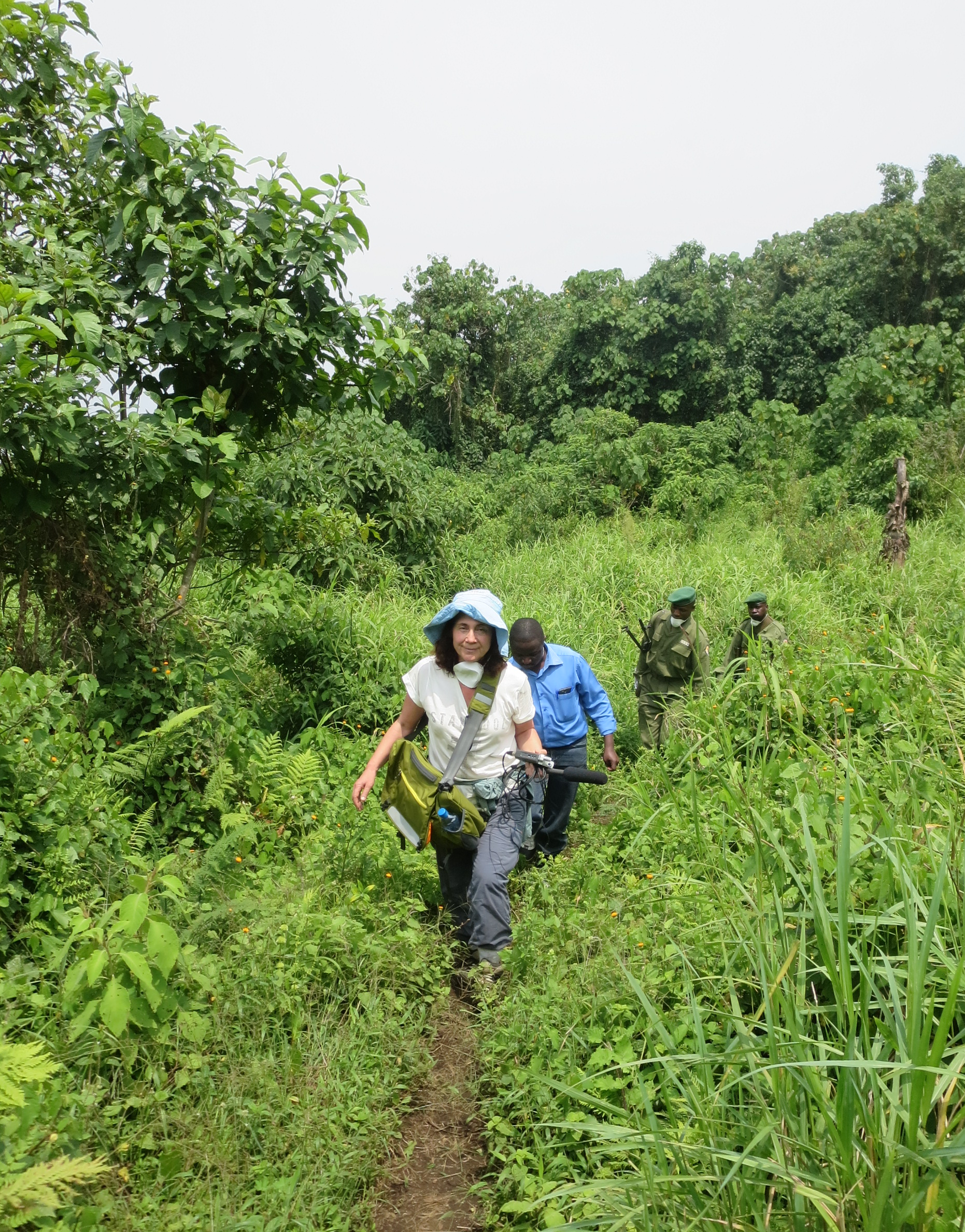
Reporter Karen Lowe returning from the visit to the gorillas. (Photo: Evelyn Iritani)
MBRUMBRWE: Come on.
LOWE: He patiently waits for me to pull myself together. He’s cool. Not even a crease in his uniform. Innocent is formal in the field, but when he sits and talks about his relationship with the gorillas, he softens.
MBRUMBRWE: I can say it’s because I love them. Every time when I'm with these animals I feel very good to be with these gorillas because they are like humans.
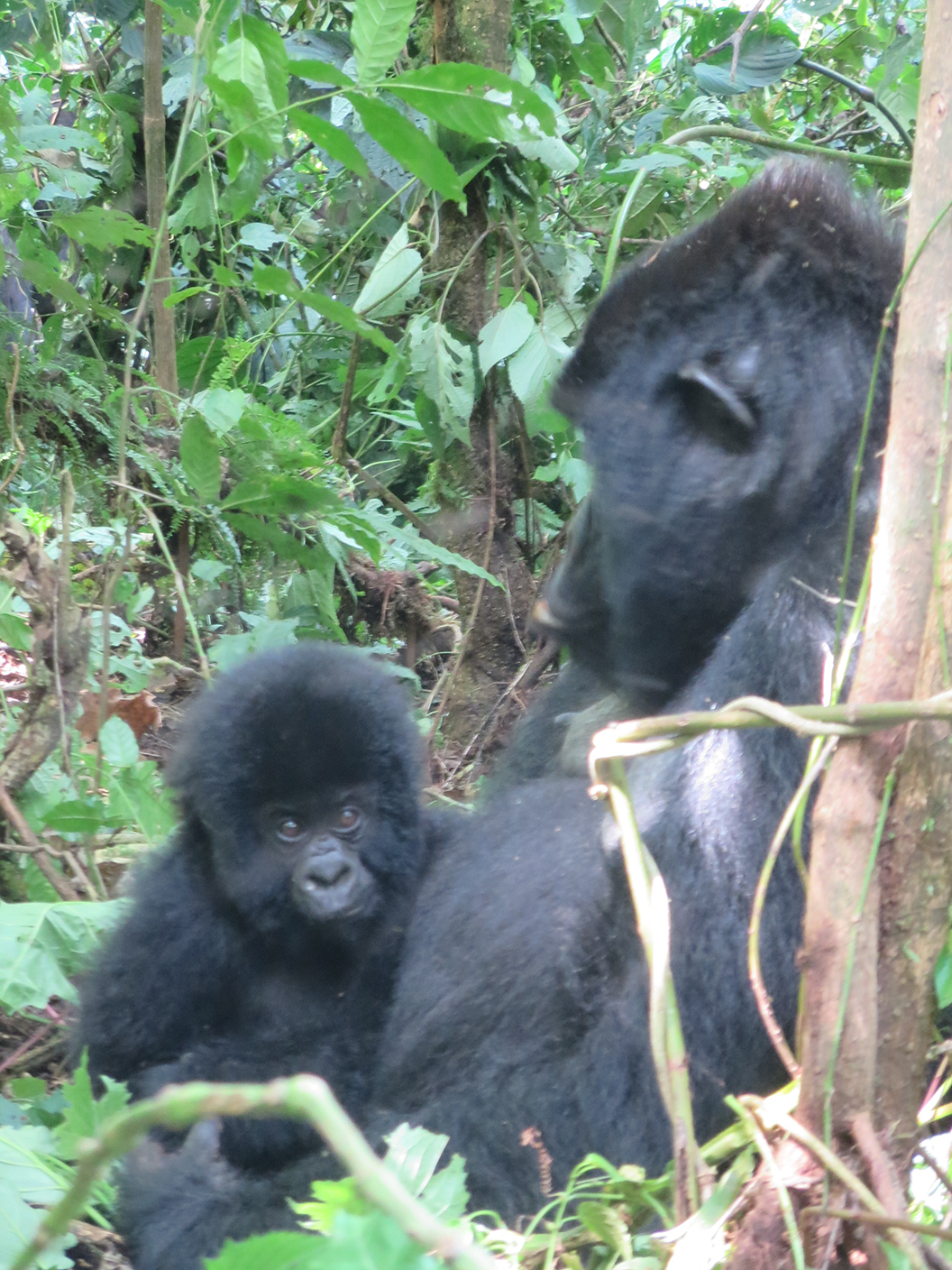
Looking after her baby (Photo: Evelyn Iritani)
LOWE: He also offers some tips on gorilla etiquette.
MBRUMBRWE: Before reaching the gorilla you have just to give the signs—meaning, you were just understanding what I was doing [GRUNT] just to communicate with the gorillas, so that it can remember that this guy’s my friend; it's not the enemy.
These are different signs, but some signs are just showing that we are friends. But the other ones are telling to the gorilla, “Please don’t approach me.” For example, this one, “hahmmm.” And another one, it’s like “haaummm.” I am not the enemy. But I just want to play, but not play. Even in the family, they communicate with each other by signs.
LOWE: Innocent spent years learning how to communicate with the gorillas and getting Humba acclimated to humans. Sometimes it got dicey.
MBRUMBRWE: At the beginning, it was very, very aggressive; you know that it’s a wild one. So coming every day, trying to give signs. And you’d see that the silverback is coming; he’s charging; he’s crying. Every individual is beating his chest; he’s coming toward you. Then you say, “Oh my God, what I am going to do?” Now, he is changing; now he’s very quiet, very calm.
LOWE: As we move through the rainforest looking for signs of Humba, Innocent occasionally grunts to announce our presence. He points out some flattened branches. That’s where Humba’s family slept overnight.
MBRUMBRWE: Another female which passed the night here—because the hair it is not white-ish. It’s black.
LOWE: We walk on, and he plucks some gorilla fur from a branch and shows it to me. Then he points down. No explanation needed—gorilla dung. Then we come to one of Humba’s sentinels.
MBRUMBRWE: It is not the chief of the family, but it’s one of their members, Nakamwe.
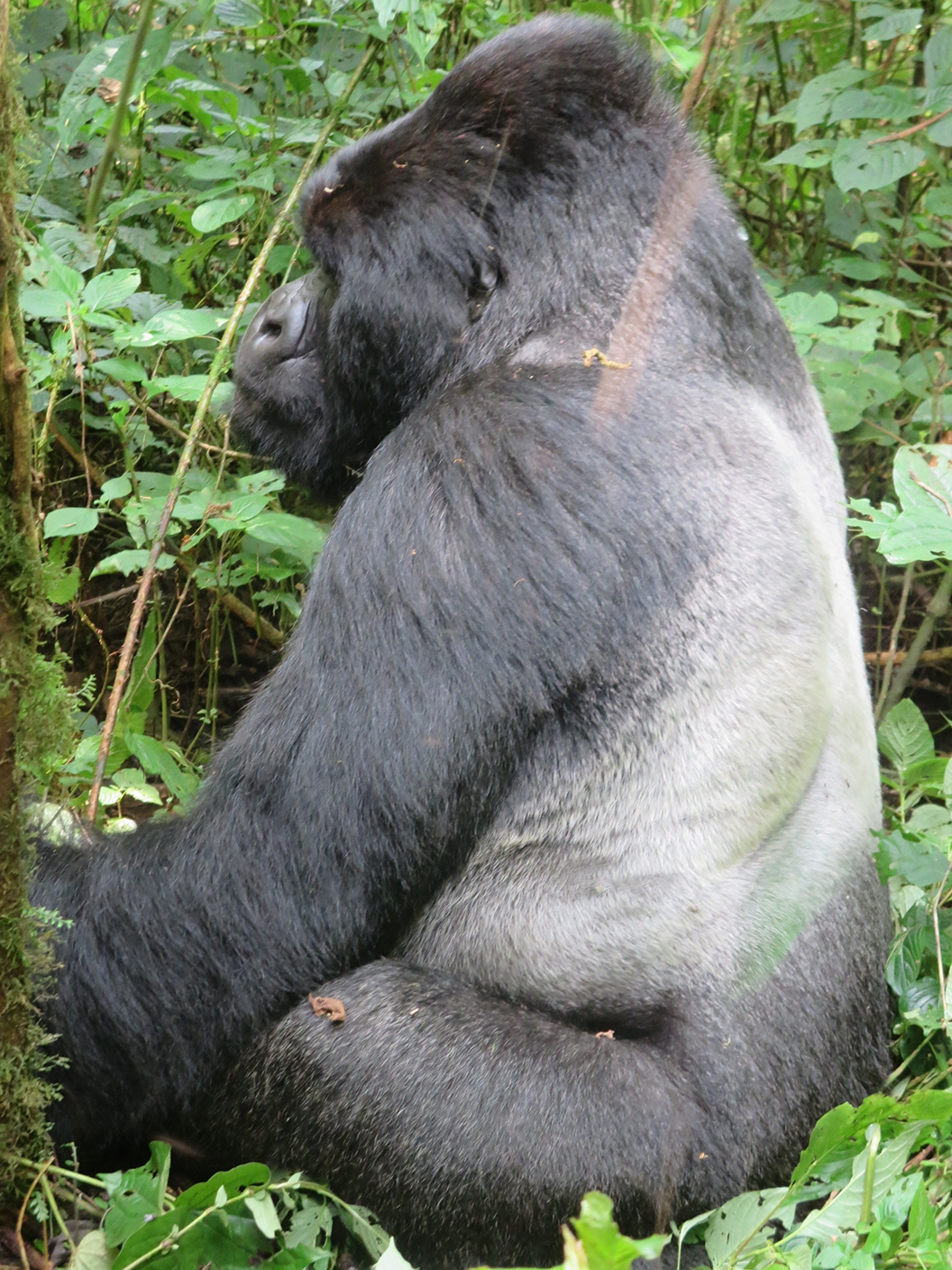
A female watches over her baby. (Photo: Evelyn Iritani)
LOWE: They greet each other with the formality of two generals. Standing about ten feet apart, [GRUNTS] they grunt and acknowledge one another respectfully. Innocent negotiates our passage.
[GRUNTS]
The gorilla turns and leads us to his family. We adjust our face masks that we were given to make sure we don’t spread any diseases to the gorillas.
As we get closer to Humba’s troop, a few gorillas beat their chests. They’re showing off for the tourists. And then, there’s Humba. He makes me feel very, very small. Mountain gorillas can weigh nearly five-hundred pounds. Their outstretched arms can measure seven feet across, and fully-grown male can be ten-times stronger than a man. Humba is completely unfazed by us.
He sits on the ground with his back to us and pulls down branches the size of saplings to eat the leaves. At one point, Humba lies on his back and crosses one knee over the other, arms behind his head: total alpha pose.
Humba’s troop and Innocent clearly are at ease with each other. Humba’s name means “peaceful.” Rather than face a fight with another silverback, he’d rather move his brood a safe distance away. I feel safe and move closer to the gorillas, which annoys Innocent a bit. He’s spotted some blood on leaves, which means there’s been some fighting before we came. There are two silverbacks in the group—possibly trouble there. There are about two dozen females, though you don’t see them all at once. But everywhere you turn, if you look closely into the brush, you will see eyes peering back at you.
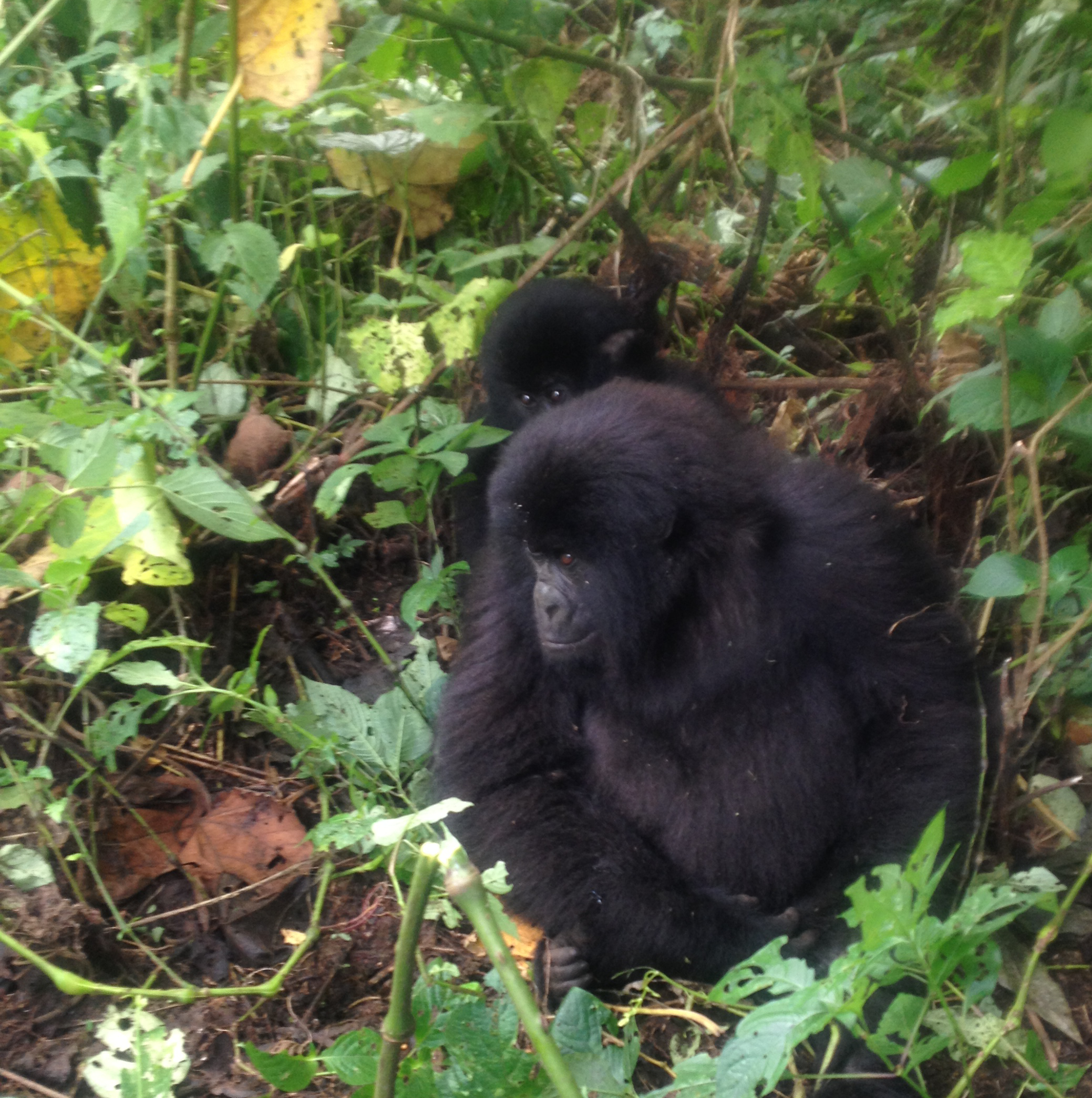
Curious baby gorillas edge closer to visitors. (Photo: Evelyn Iritani)
[COUGHING]
LOWE: I cough a few times and each time I do, one of the gorillas does too. They’re mimicking me. Juveniles roll around in play—a ball of fur and feet. A baby grabs for my camera, but Innocent gently shoos him away with branches. Then Humba walks in my direction. I hold my breath as the giant silverback moves past me just a few yards away. You can see the power ripple across his back and shoulders. After about an hour, Innocent tells us we have to leave.
[FOOTSTEPS]
LOWE: As I walk away, I look back at gorillas peacefully eating and playing, and I wonder: Can this last? They face a lot of problems. Potentially the biggest one isn’t even visible yet. The Congolese government granted a London-based oil company rights to explore for oil in an area that would cover about half of the park. The oil company called SOCO is finishing seismic testing in a nearby lake. It’s uncertain what will happen once they’re done. I want to talk to the park warden about this.
[BIRDS CHIRPING]
LOWE: So, the next day I walk over to Mikeno Lodge at Virunga Park headquarters. The Director is Emmanuel de Merode. He’s a primatologist by training and a Belgian prince by birth, though he never mentions that. He’s dressed in a green uniform with a rolled up beret pinned to his shoulder.
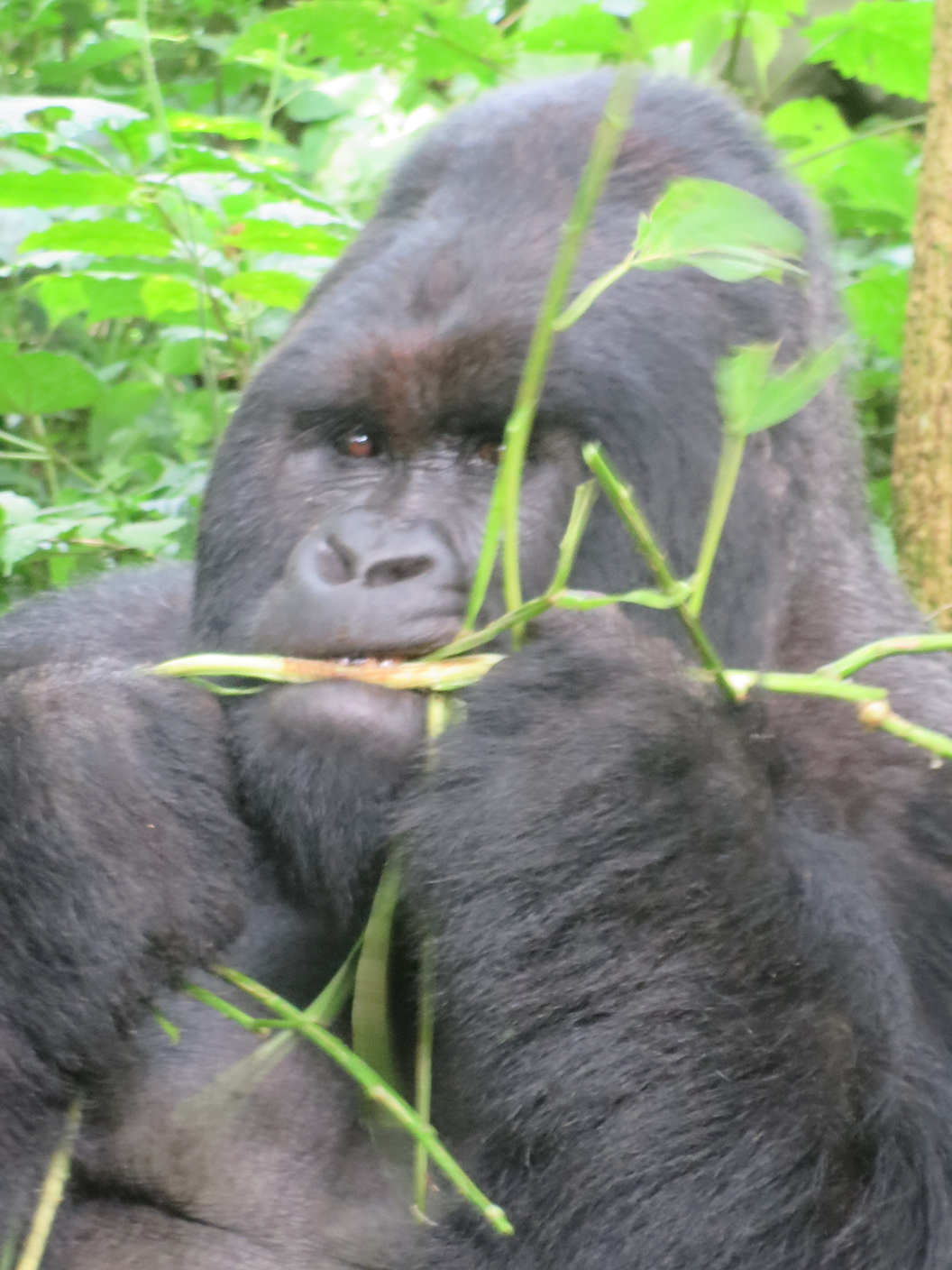
A close-up of Humba eating leaves and vines (Photo: Evelyn Iritani)
On the day we talk, he’s optimistic about turning the park into an economic engine. He says tourism and agricultural projects, like coffee and cocoa plantations, could generate as many forty-thousand jobs. They’re also building hydroelectric power plants that could generate enough electricity to cover park expenses for the next eighty to one-hundred years. De Merode says if oil is to come, there needs to be enforceable regulations and resources in place because of the potential risks.
DE MERODE: The risks, of course are, have to do with an accident. There isn’t a single oil field on Earth where there hasn’t been an accident. To say there won’t be an accident in Congo is ambitious, I’d say.
The other issue of course is all the spin-off effects of an activity like that, that need to be managed very, very carefully. In economic thinking, they talk about "le mal Hollandais", the Dutch disease. It’s a term that’s used for, when you have a region like this, and suddenly a massive influx of activity tied to a single industry which is oil, it kills off a lot of other activities around it because it just swamps it.
LOWE: And then there are the direct threats inside the park to the gorillas. He recalled the night in July 2007, before he became a park warden, when he and Innocent heard gunshots in the bush.
DE MERODE: So, the next morning we went out and walked through the rain for several hours and eventually came upon a terrible scene, which was the massacre of the Ruwenga group of gorillas. And basically, we found four bodies of the mountain gorillas, and they’d been killed. The fifth one was found several days later. They’d all been shot at very short, close range. One of them had been shot and doused in petrol and set alight. It was a very brutal, very vicious killing.
LOWE: De Merode says the massacre was the work of charcoal traders. They’d been cutting down trees for fuel at an alarming rate. The Congo’s charcoal trade is worth millions. That’s a lot of money here, where the average annual income is $120 dollars a year, and the militias are getting a cut. Park rangers were getting in the way of business.
DE MERODE: The rangers really are on the front line trying to prevent the forests from being destroyed, in particular the gorillas’ habitat. So by killing all the gorillas, these militias were betting on the fact that it would discourage the rangers and stop them from protecting the forest, so that they could access it and make money. It was a very, very violent scene. It was extremely brutal. And for Innocent, it was all the more terrible because that was his lifetime’s work, and it was also his father’s lifetime’s work. His father died protecting those gorillas.
LOWE: At the time of the massacre, de Merode was working with a conservation group and Innocent was leading the rangers. Corrupt officials were blaming him for the attack.
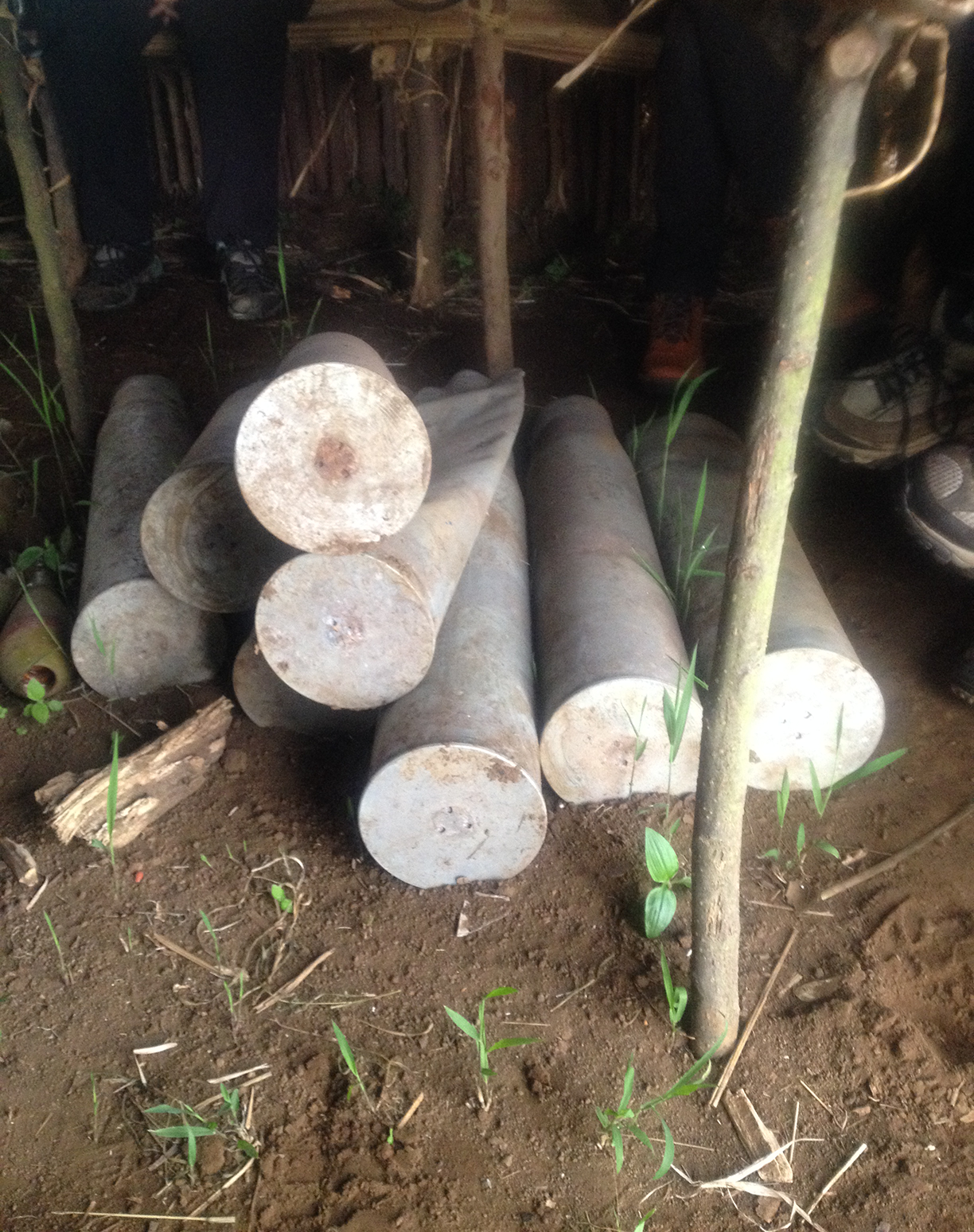
Spent shells collected by rangers from fighting in the bush with rebel groups and charcoal traders. The shells are kept at a patrol station only a 45-minute walk to the Humba troop. (Photo: Evelyn Iritani)
DE MERODE: And he actually went to prison for it. They were trumped up charges. They accused him of resisting arrest. And they tried to turn things against him, and they tried to blame him for killing of the gorillas—of negligence, of not protecting them adequately. And so, he was arrested and quite badly beaten when he was in prison. We were able to get him out after a few days, and eventually we able to demand an inquiry into the whole thing. And the real people responsible were eventually arrested.
[WALKING WITH BIRDS CHIRPING IN DISTANCE]
LOWE: After that incident, the Congolese government wanted someone who was not caught up in local rivalries to run the park. That meant bringing in an outsider; they offered it to Emmanuel. That was an interesting choice, given that Belgium ruthlessly exploited the Congo when it was a colony. Emmanuel became the only foreign national to have judicial powers in the Congo. His first mission was to find out what was happening with the gorillas. But rebel fighting made it too dangerous to go in. Ultimately, he brokered a deal with all the warring parties to let the rangers back into the gorilla sector.
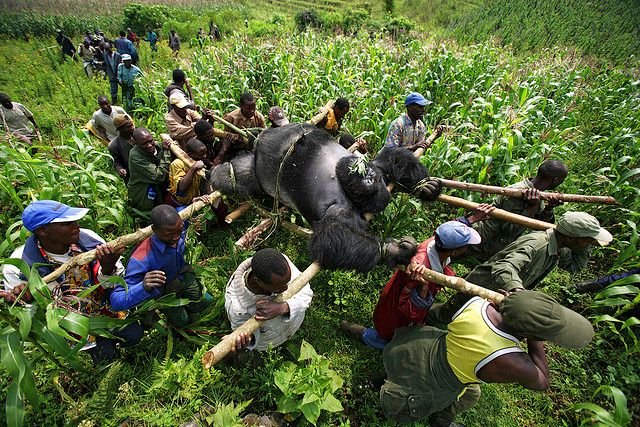
Conservation Rangers from an Anti-Poaching unit work with locals to evacuate the bodies of four Mountain Gorillas killed in mysterious circumstances in Virunga National Park, Eastern Congo. (Photo: Dawai Ding; Flickr Creative Commons 2.0)
DE MERODE: We had been away for a very long time because of the war. We crossed the front line and went up into the hills, into the forest, right up into the mountains, and finally saw the Humba group, which we hadn’t seen for fifteen months. And they immediately went to him. So, Humba himself, the silverback, immediately went right up to Innocent, walking past me and the others, and straight to him. So there is no doubt in my mind that he has a very unique relationship with the gorillas.
LOWE: That kind of relationship between the rangers and the gorillas is key for tourism, and if Emmanuel just had to contend with poachers and rebels, his seven-hundred rangers might be able to hold the line. But the prospects for oil in the DRC have dramatically ratcheted up tensions over the past few years. In addition to the shootings, there have been recent death threats against conservation activists. Emmanuel and his rangers took huge personal risks. Innocent has not only buried his father and his brother, but now one of his sons has told him that he, too, wants to be a ranger.
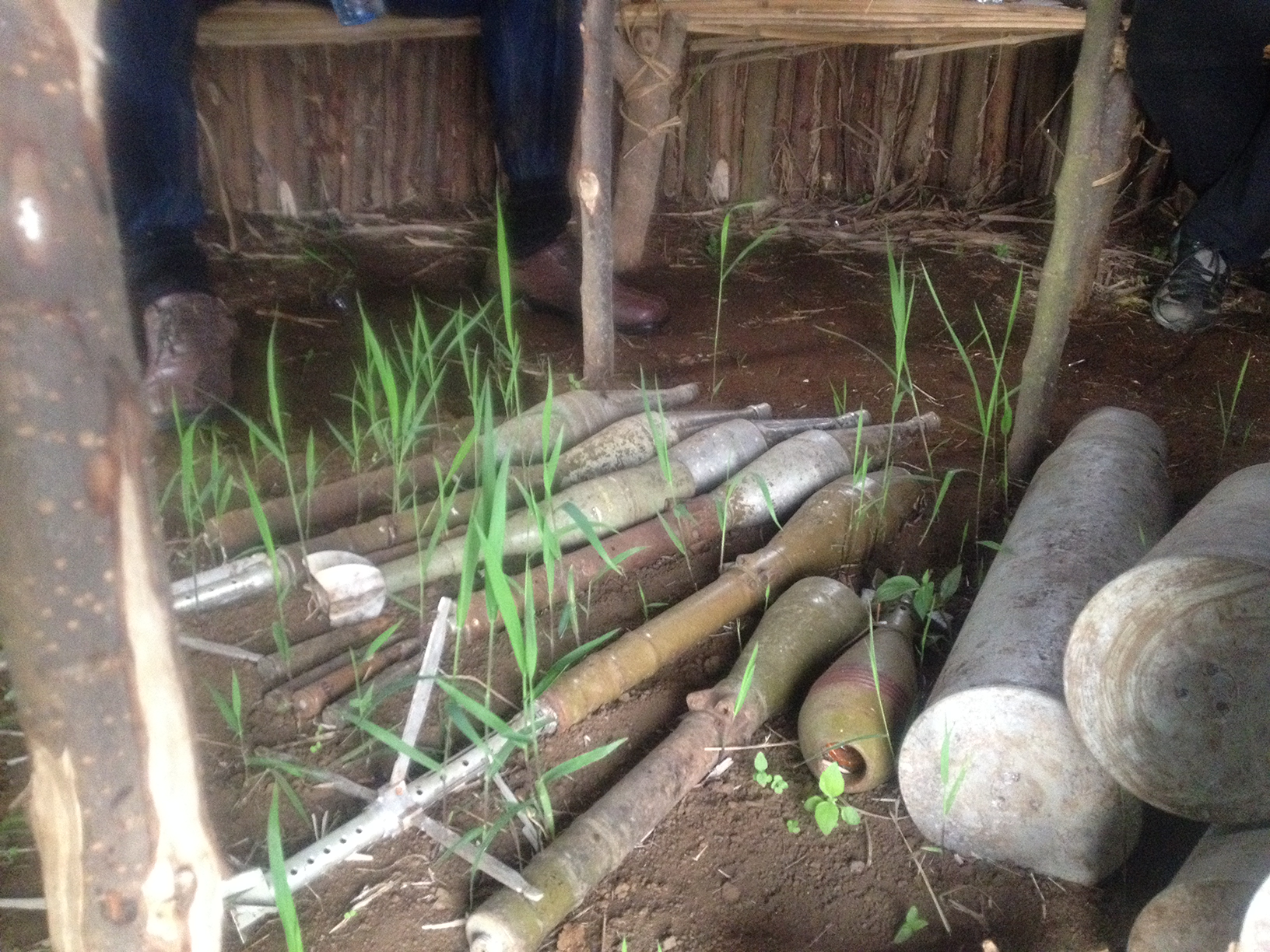
Another view of the spend shells collected by the rangers in Virunga National Park (Photo: Evelyn Iritani)
Asked if it’s worth it, Emmanuel is unequivocal.
DE MERODE: That’s not a question you can ask yourself. If you start to ask yourself that question, then it becomes an impossible situation, you know. We have to do our job. It’s just the decision we made when we decided to become rangers.
[WALKING SOUNDS]
LOWE: When we walk back down the mountain out of the park, we stop at the ranger’s post. It’s hard not to notice the spent rocket and mortar shells heaped in a pile on the ground from past combat over the Congo’s riches. One of the great potentials in that conflict is the robust biodiversity of Virunga National Park, and that includes the mountain gorillas.
From the Democratic Republic of Congo, I’m Karen Lowe.
CURWOOD: Karen's trip to Virunga National Park was supported by the International Women in Media Foundation, and she's still on the line with us now. Karen, it sounds like things are pretty tense on the ground there in the Democratic Republic of Congo. What exactly is going on?
LOWE: Right now there is a sense of euphoria among the park rangers and conservationists because SOCO oil has agreed to suspend exploring in the Virunga National Park or any UNESCO World Heritage site around the globe. It is a victory for conservationists, a big one, at least for now. But SOCO will finish what it set out to do—seismic testing for oil on Lake Edward. It is one of East Africa's great lakes and it supports about eighty-thousand people. What this agreement means is after the seismic testing is done, any actual drilling must be done with UNESCO’s blessing.
But this victory came at great cost, and we have to remember SOCO's activities have only been suspended. We still don’t know how things will play out in the long run, and the DRC government still hasn’t said what it will do.
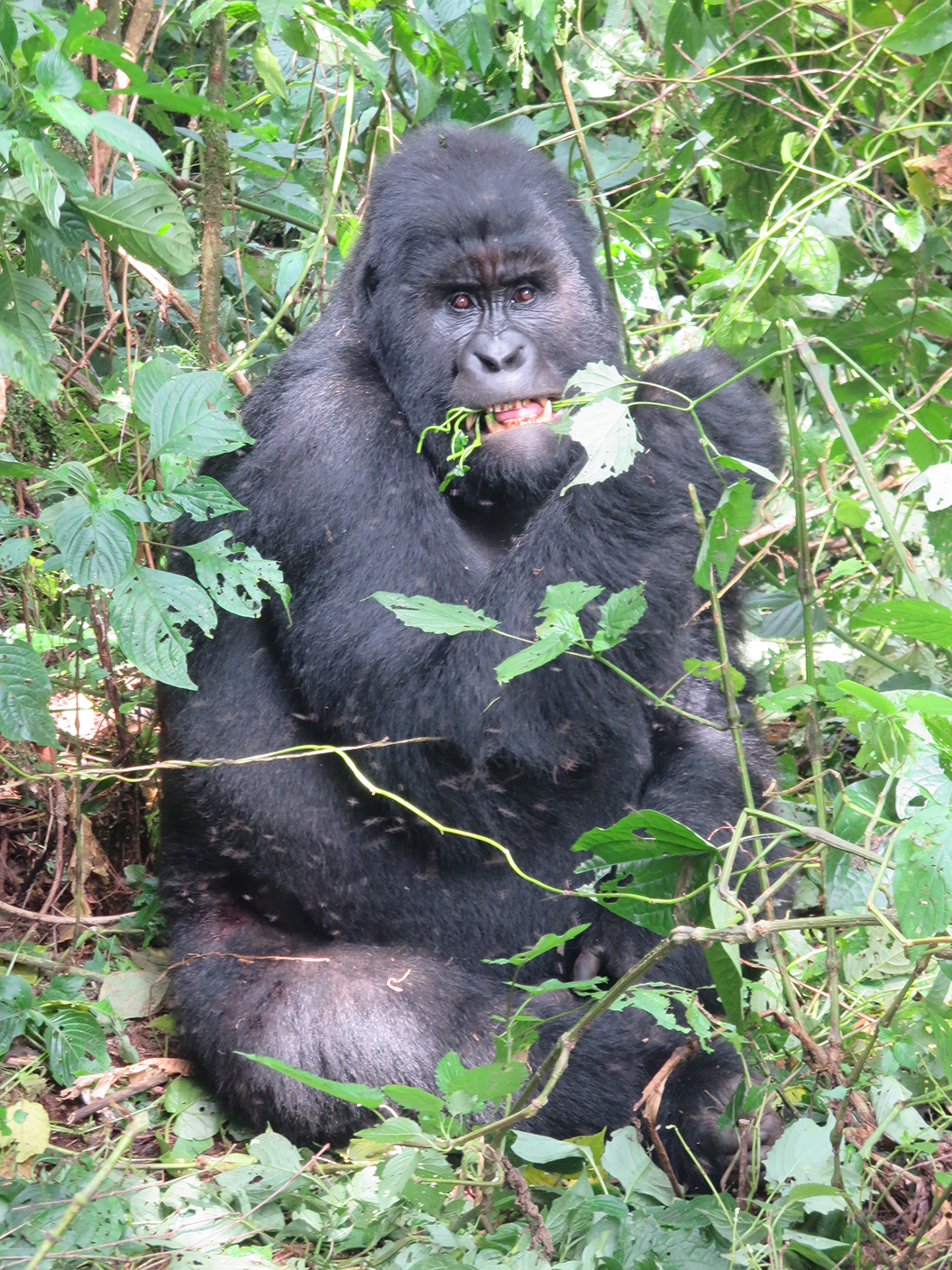
Humba casually nibbles on vines and leaves. (Photo: Evelyn Iritani)
CURWOOD: What about the conservationists? What kinds of concessions have they made, and how did things change so quickly?
LOWE: As part of the deal, the World Wildlife Fund, which lobbied mightily against SOCO, has agreed to drop its demand for a probe of SOCO. The oil company's publicly traded, and the WWF had alleged SOCO had breached global corporate responsibility standards. It took a long time to get to this point, and there's been a lot of violence over the park. But the thing that probably forced SOCO’s hand was the shooting of Park Director, Emmanuel de Merode.
CURWOOD: What he got shot?
LOWE: Yeah, he was hit four times as he was driving through the park, and he was only five-hundred meters from a military post. He’s okay now. He was treated in Nairobi, and he’s back in the park. But SOCO has condemned the shooting and denied any responsibility for it. De Merode was shot just a few hours after he had delivered to the Congolese prosecutor the results of a three-year investigation. That probe was approved by the Congolese court in 2010. The document contained allegations of intimidation and bribery carried out by those who wanted to open the park to oil exploration and drilling. The investigation is a separate matter from the World Wildlife Fund allegations; so, all of this doesn't just go away.
CURWOOD: What are some of the specific allegations that were in the report delivered by de Merode to the prosecutor?
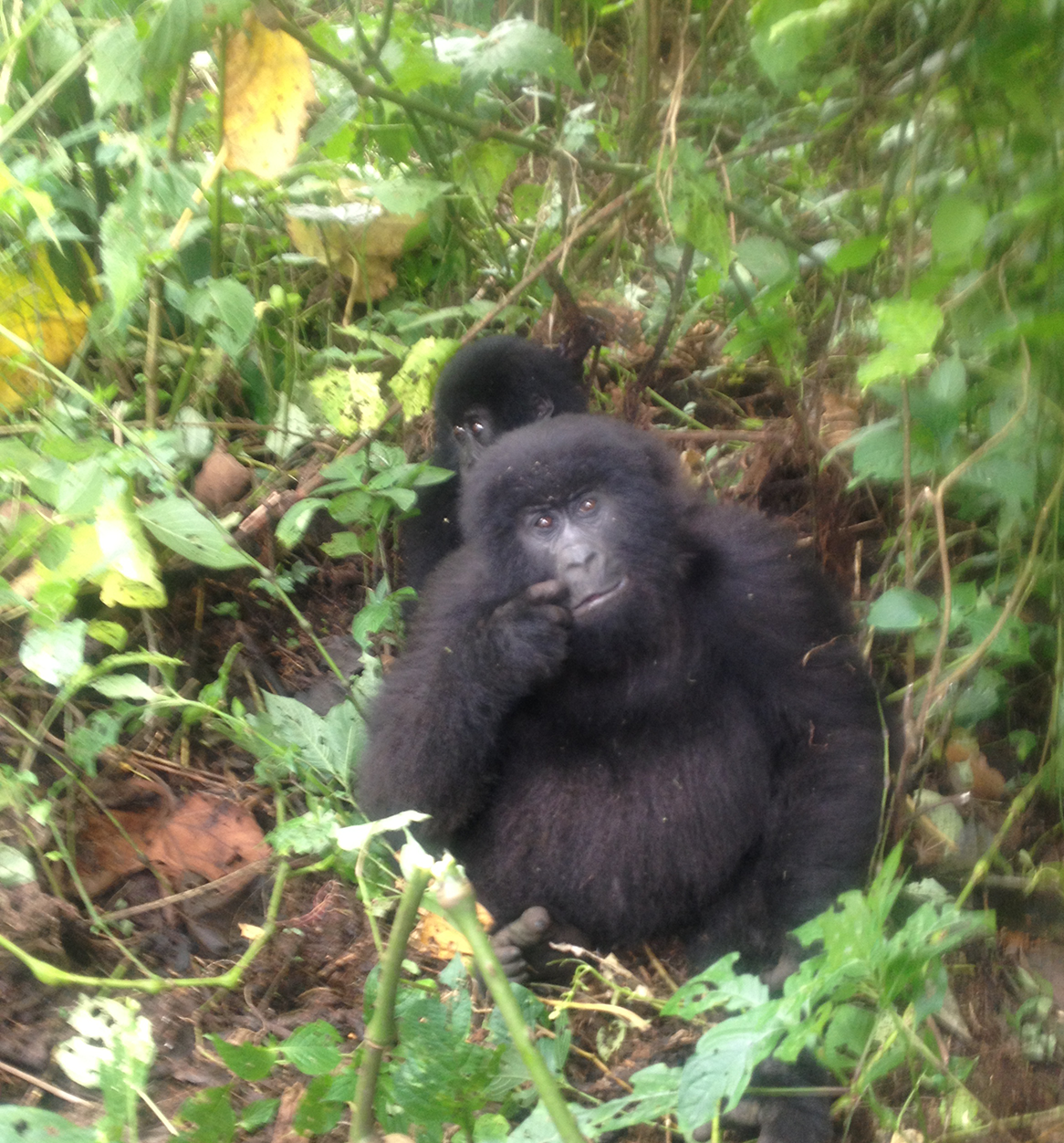
Baby gorillas keep a curious watch on human visitors. (Photo: Evelyn Iritani)
LOWE: Basically, that elements of the Congolese government and military, who favored drilling, allegedly used bribery, torture and death threats against activists and park staff. Those threats go back for years and had been getting progressively more violent. The report also says that park authorities found that a SOCO oil representative paid a senior park official several thousand dollars to support SOCO activities. And then that park official later threatened to fire rangers who didn’t go along with the oil development plan. There were also instances of torture. There were some pretty horrific elements too. When the head of the park’s central sector resisted pressure to open the park to oil interests, he and his brother were badly tortured; then their captors paraded the park official through his neighborhood and snuffed out burning cigarettes on his head—a not too subtle message to others.
CURWOOD: What role did international attention play?
LOWE: There was tremendous international pressure applied. The showdown got widespread media coverage, especially after a movie "Virunga" was released. The producers managed to catch on tape some of the shady dealings, and recently Human Rights Watch called on Belgium to investigate the attack on de Merode, who is one of its own nationals.
The Human Rights group also asked the U.K. to investigate—under the UK Bribery Act—whether any of the alleged acts of corruption and bribery might have led to attacks on rangers and activists. If there are violations, SOCO and its officials could face criminal prosecution.
CURWOOD: It seems pretty clear that someone wanted de Merode dead. Who do you think?
LOWE: Yeah, there are a number of parties aside from SOCO who wanted oil drilling to happen, including elements of the military and rebel groups. They always profit from resource extraction in the Congo, and they're not so worried about what’s legal. So they just might have just seen de Merode as someone who’s getting in the way of business.
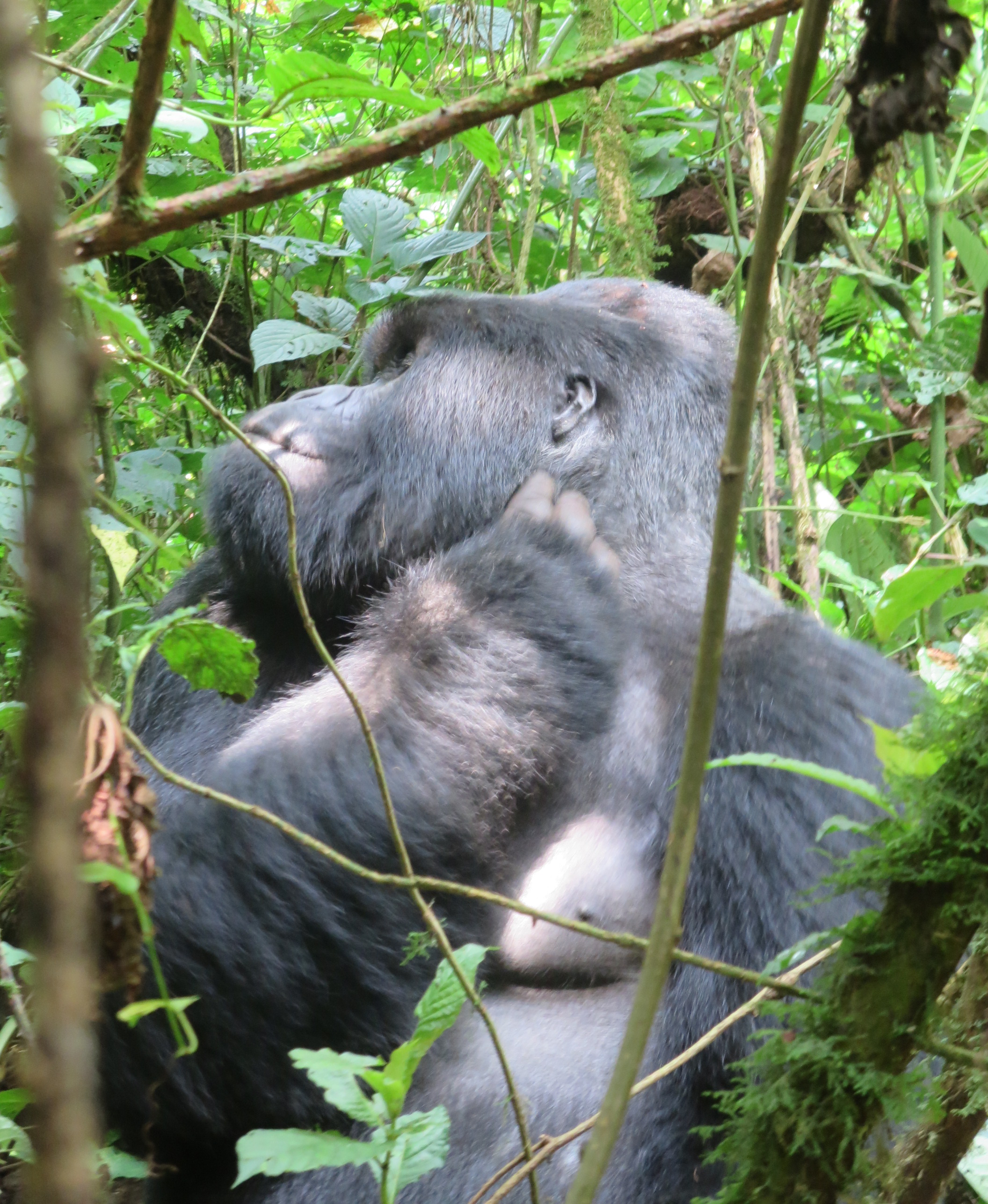
Most of the time, Humba leads a relaxed life with his family. They spend hours eating, preening and playing. (Photo: Evelyn Iritani)
CURWOOD: So what does de Merode do now?
LOWE: For de Merode, Virunga National Park is a UNESCO World Heritage site, and he’s determined to protect it. He’s driven by what he sees as a perfectly achievable ambition: get the park functioning as a tourism and agricultural enterprise, and a lot more people will benefit from that than they will from oil. And he's got proof right next door: Rwanda endured a horrific genocide fifteen years ago, and it’s pretty much recovered. And a big part of its economy is tourism. It makes about $430 million dollars a year—mostly from tourists who want to see gorillas. So de Merode figures the DRC can do this too, especially since Virunga has more natural attractions.
CURWOOD: So what kind of help is he getting pushing ahead with this?
LOWE: For one thing, the philanthropist Howard Buffet is a huge supporter. He’s an avid environmentalist, and he's also the son of multi-billionaire, Warren Buffet. He’s poured $20 million dollars into hiring park rangers, and getting the lodge ready for luxury tourism and he’s also developing hydroelectric power. The idea there is that if people get electricity they’ll be less likely to burn the forest for charcoal. When I asked Howard Buffet how long he can keep supporting de Merode’s efforts, here’s what he told me.
BUFFET: This is one of those things where there is no second chance. There is no “Well, if it doesn’t work, we’ll go to Plan B.” There is no Plan B; so, you can’t let them do this.
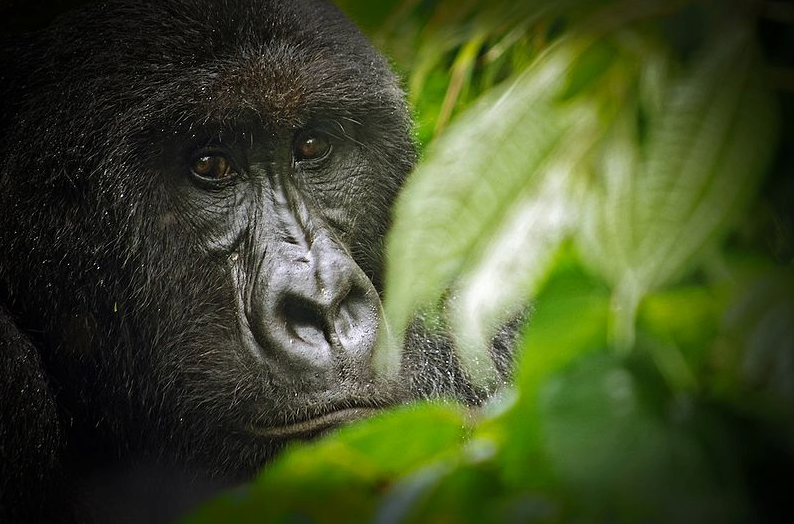
Mountain Gorilla in Virunga National Park (Photo: LuAnne Cadd/ Wikimedia Commons 3.0)
CURWOOD: One last question Karen: How’s Humba doing?
LOWE: Oh, Humba. He suffered a setback. The other silverback in his group challenged his dominance, and as we know, Humba doesn’t like to fight. So that must have been hard on him. Somehow he’s making do with six of the troops’ sixteen females though.
CURWOOD: That's Karen Lowe, just back from the DRC with a tale of its gorillas, the people trying to look after them and the threats still facing them.
Links
Visit the tourism site of Virunga National Park
Read more about Virunga National Park, DRC
Living on Earth wants to hear from you!
Living on Earth
62 Calef Highway, Suite 212
Lee, NH 03861
Telephone: 617-287-4121
E-mail: comments@loe.org
Newsletter [Click here]
Donate to Living on Earth!
Living on Earth is an independent media program and relies entirely on contributions from listeners and institutions supporting public service. Please donate now to preserve an independent environmental voice.
NewsletterLiving on Earth offers a weekly delivery of the show's rundown to your mailbox. Sign up for our newsletter today!
 Sailors For The Sea: Be the change you want to sea.
Sailors For The Sea: Be the change you want to sea.
 The Grantham Foundation for the Protection of the Environment: Committed to protecting and improving the health of the global environment.
The Grantham Foundation for the Protection of the Environment: Committed to protecting and improving the health of the global environment.
 Contribute to Living on Earth and receive, as our gift to you, an archival print of one of Mark Seth Lender's extraordinary wildlife photographs. Follow the link to see Mark's current collection of photographs.
Contribute to Living on Earth and receive, as our gift to you, an archival print of one of Mark Seth Lender's extraordinary wildlife photographs. Follow the link to see Mark's current collection of photographs.
 Buy a signed copy of Mark Seth Lender's book Smeagull the Seagull & support Living on Earth
Buy a signed copy of Mark Seth Lender's book Smeagull the Seagull & support Living on Earth

